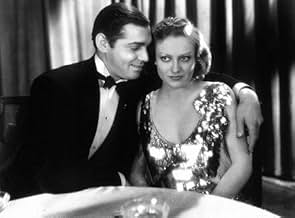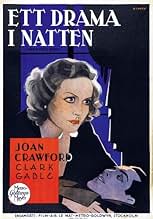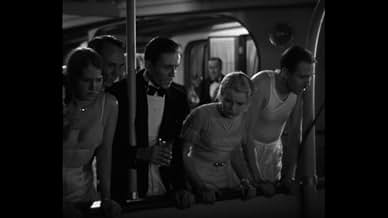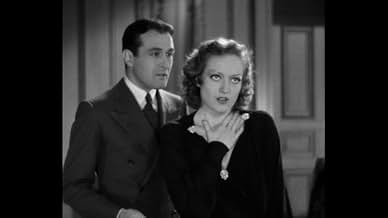Ajouter une intrigue dans votre langueAfter the death of her father and loss of the family fortune, Bonnie (Joan Crawford) gets a job as a cub reporter while her brother (William Bakewell) becomes involved in bootlegging.After the death of her father and loss of the family fortune, Bonnie (Joan Crawford) gets a job as a cub reporter while her brother (William Bakewell) becomes involved in bootlegging.After the death of her father and loss of the family fortune, Bonnie (Joan Crawford) gets a job as a cub reporter while her brother (William Bakewell) becomes involved in bootlegging.
- Prix
- 1 victoire au total
- Wally
- (as Earl Foxe)
- Parker
- (as Purnell B. Pratt)
- Luva's Henchman
- (uncredited)
- Albert
- (uncredited)
- Yacht Waiter
- (uncredited)
- Clinton
- (uncredited)
- Chorus Girl
- (uncredited)
- Reporter
- (uncredited)
Avis en vedette
But none of this is supposed to be taken seriously - it's all good fun from those wonderful pre-code days, when Hollywood was really naughty. Joan looks great, and displays much of the emotional range that would give her career such longevity (thank God she stopped the dancing!). Gable is remarkable as a slimy gangster - he wasn't a star yet and so didn't have to be the hero. Great to see him playing something different. And William Bakewell is excellent as the poor confused brother. And there are some great montages and tracking shots courtesy of director Harry Beaumont, who moves the piece on with a cracking pace - and an occasional wink to the audience! Great fun!
The film is largely an unremarkable morality tale about the follies of the very wealthy spoiling their children even into adulthood to the point where they complain about having to "get up in the middle of the night (9 AM) to eat breakfast.", which are the sentiments of the two Jordan children. When Wall Street crashes, dad dies from the shock and Bonnie Jordan (Joan Crawford) and her brother are left penniless. Bonnie chooses to break into newspaper reporting, but her brother chooses a less honest option which brings him into contact with Gable the gangster. After her close friend, reporter Bert Scranton (Cliff Edwards), is shot to death, Bonnie decides to go undercover as a dancer at Gable's nightclub to try to get to the bottom of the murder. She solves the crime, but at great personal cost.
The best parts of this film are watching Joan Crawford in a dance number and watching the great chemistry Crawford and Gable have together. You get bigger doses of Crawford and Gable together in "Possessed", which was made later this same year - 1931. Joan Crawford was already a big star at this point. As for Clark Gable, he has to wait until he manhandles Norma Shearer in "A Free Soul" before he catapults to true stardom.
In the 30s, Hollywood had a knack for churning out one entertaining *and* enlightening audience-pleaser after another, all without wasting a frame of film. Dance, Fools, Dance -- one of *four* films that Harry Beaumont directed in 1931 -- is barely 80 minutes long, yet its characters are well developed, its story never seems rushed, and despite its many twists in plot, the audience is never left behind.
With the lone exception of Lester Vail as flaccid love interest Bob Townsend, the supporting cast is uniformly strong. Worthy of note are William Bakewell as Crawford's brother, Cliff Edwards (best known as the voice of Jiminy Cricket) as reporter Bert Scranton, and Clark Gable in an early supporting role as gangster Jake Luva.
But this is Joan Crawford's film, and she absolutely shines in it. Made when she was just 27, this lesser-known version of Crawford will probably be unrecognizable to those more familiar with her later work. However, here is proof that long before she took home an Oscar for Mildred Pierce, Crawford was a star in the true sense of the word, a terrific actress with the charisma to carry a picture all by herself.
Score: EIGHT out of TEN
Middle-of-the-road crime drama will appeal most to fans of Crawford and Gable. It's hardly the best work of either, though. It's a pre-Code film, which sometimes is all you have to say to get some classic film fans interested in a movie. Personally I didn't see anything all that risqué in this one. An early scene of a bunch of people in their underwear going for a swim seems to get the most talk but it's pretty tame despite the description. The story is something that was done many times and better over the years, in one variation or another. The insipid romance between Joan and Lester Vail leaves a lot to be desired.
Le saviez-vous
- Anecdotes"Dance, Fools, Dance" is clearly based on two infamous incidents in Chicago crime history: the 1929 St. Valentine's Day Massacre in a garage and the June 9, 1930 murder of Chicago Tribune reporter Jake Lingle, who was shot while heading to a train station. However, unlike the movie's Bert Scranton, Lingle was a shady character who played both sides of the law and had parlayed a $65 a week salary into a $60,000 income. In journalistic terms, Lingle was known as a legman who would telephone in the salient details of the story which would be actually written by a rewrite man. This is what happens when Joan Crawford's Bonnie phones in her story after the shootout.
- GaffesWhen in the newsroom Scranton tells Bonnie that if they had a chance they would cut the Lord's Prayer to a one-line squib and he quotes, "Now I lay me down to sleep". But the line is not from the Lord's Prayer, it is actually the first line and title of the bedtime prayer, "Now I Lay Me Down To Sleep".
- Citations
Bob: You know I'm very much in love with you, don't you?
Bonnie: Are you?
Bob: I'm crazy about you, and you know it.
Bonnie: I didn't know.
Bob: Well, you know it now. What about it?
Bonnie: That's it... what?
Bob: Going to make me stand on ceremony?
Bonnie: You think I'm so old-fashioned?
Bob: I hope not.
Bonnie: You're right. I'm not. I believe in... in trying love out.
Bob: On approval?
Bonnie: Yes, on approval.
[they kiss as the scene fades out]
- ConnexionsEdited into Hollywood: The Dream Factory (1972)
- Bandes originalesPiano Sonata No. 14 in C sharp minor, Op. 27 No. 2 'Moonlight'
(1800-01) (uncredited)
Written by Ludwig van Beethoven
Played on piano by Natalie Moorhead
Reprised on piano by Joan Crawford in a swing version
Meilleurs choix
Détails
- Date de sortie
- Pays d’origine
- Langue
- Aussi connu sous le nom de
- Plesačica Boni
- Lieux de tournage
- société de production
- Consultez plus de crédits d'entreprise sur IMDbPro
Box-office
- Budget
- 234 000 $ US (estimation)
- Durée1 heure 20 minutes
- Couleur
- Rapport de forme
- 1.20 : 1
Contribuer à cette page
























